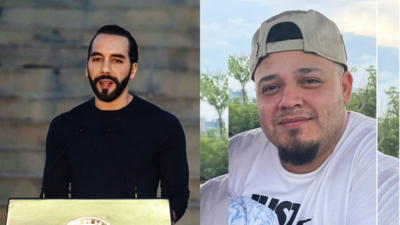
El Salvador
President
Nayib Bukele
has proposed a high-stakes
prisoner swap
with
Venezuela
, offering to return 252 Venezuelans deported from the United States and detained in El Salvador in exchange for the release of an equal number of
political prisoners
held by President
Nicolás Maduro
’s government. Among those detained is Kilmar Abrego Garcia, a US deportee whose recent transfer from the notorious CECOT prison to a less severe facility came just days before
US Senator
Chris Van Hollen visited the country to advocate for his release.
Senator Van Hollen, who met Abrego Garcia on April 17, confirmed that the 29-year-old is no longer held at CECOT. Instead, he is now at the Centro Industrial detention facility in Santa Ana, where he is reportedly housed alone in an administrative building with a bed and furniture. Van Hollen, speaking after returning to the US , reiterated that "a federal judge said there's ‘no evidence linking Abrego Garcia to MS-13 or to any terrorist activity.’ Trump needs to put up or shut up IN COURT."
President Donald Trump, however, continued to assert that Abrego Garcia is a member of the violent gang MS-13, accusing Democrats and media outlets of attempting to sanitise his image. “Radical Lunatic Democrats... are falsely making Kilmar Armando Abrego Garcia out to be a very sweet and innocent person, which is a total, blatant, and dangerous LIE,” Trump posted on Truth Social.
The controversy over Abrego Garcia comes as the broader deportation programme faces legal hurdles. A recent Supreme Court ruling has temporarily halted deportations under the 1798 Alien Enemies Act. Senator Van Hollen and other Democrats have warned the situation may be pushing the country toward a constitutional crisis, with Van Hollen stating, "we have a lawless president... who is ignoring the order of the Supreme Court of the United States."
Amid these tensions, Bukele’s prisoner exchange offer marks a dramatic geopolitical move. “I want to propose to you a humanitarian agreement,” Bukele wrote to Maduro on X, offering to return all 252 Venezuelans detained in El Salvador, some of whom he said were arrested multiple times in the US for crimes like murder and rape. “Unlike our detainees... your political prisoners have not committed any crime. The only reason they are imprisoned is because they have opposed you and your electoral frauds.”
Bukele named several high-profile political prisoners he wants released, including Rafael Tudares (son-in-law of exiled opposition leader Edmundo González), journalist Roland Carreño, lawyer Rocío San Miguel, and others seeking asylum at Argentina’s embassy in Caracas. He also requested the release of about 50 detained foreigners, including US citizens.
Venezuela has pushed back strongly. Attorney General Tarek William Saab condemned Bukele’s offer as “cynical,” demanding a complete list of the detained Venezuelans along with their health status and legal records. He also accused El Salvador of violating the human rights of its nationals by holding them in maximum security confinement without due process.
While Bukele claims the prisoners were apprehended during joint US -El Salvador operations targeting gangs like Tren de Aragua and MS-13, both governments have offered little evidence to support the detainees’ gang affiliations. Maduro’s administration, in turn, has called the deportations a “kidnapping” and insists the individuals are not criminals.
With the future of these detainees and Venezuela's political prisoners hanging in the balance, the proposal places pressure on both Caracas and Washington to respond. Whether the deal moves forward could depend as much on legal rulings in the US as it does on Venezuela’s willingness to negotiate.

 1 month ago
57
1 month ago
57




























 English (US)
English (US)